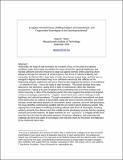| dc.contributor.author | Davis, Diane E. | |
| dc.date.accessioned | 2010-02-24T18:41:29Z | |
| dc.date.available | 2010-02-24T18:41:29Z | |
| dc.date.issued | 2010-05 | |
| dc.date.submitted | 2009-09 | |
| dc.identifier.issn | 0304-2421 | |
| dc.identifier.uri | http://hdl.handle.net/1721.1/51817 | |
| dc.description.abstract | Historically, the study of state formation has involved a focus on the urban and national conditions under which states monopolize the means of coercion, generate legitimacy, and marshal sufficient economic resources to wage war against enemies while sustaining citizen allegiance through the extension of social programs, new forms of national solidarity, and citizenship. In Charles Tilly’s large body of work, these themes loomed large, and they have re-emerged in slightly reformulated ways in an unfinished manuscript that reflected on the relationship between capital and coercion in which he also integrated the element of commitment – or networks of trust -- into to the study of state formation. This article develops these same ideas but in new directions, casting them in light of contemporary rather than historical developments. Taking as its point of departure the accelerating rates of criminal violence and citizen insecurity in cities of the developing world, this essay suggests that random and targeted violence increasingly perpetrated by” irregular” armed forces pose a direct challenge to state legitimacy and national sovereignty. Through examination of urban and transnational non-state armed actors who use violence to accumulate capital and secure economic dominion, and whose activities reveal alternative networks of commitment, power, authority, and even self-governance, this essay identifies contemporary parallels with the pre-modern period studied by Charles Tilly, arguing that current patterns challenge prevailing national-state forms of sovereignty. Drawing evidence primarily from Mexico and other middle income developing countries that face growing insecurity and armed violence, the paper examines the new “spatialities” of irregular armed force, how they form the basis for alternative networks of coercion, allegiance, and reciprocity that challenge old forms and scales of sovereignty, and what this means for the power and legitimacy of the traditional nation-state. | en |
| dc.description.sponsorship | John D. and Catherine T. MacArthur Foundation | en |
| dc.description.sponsorship | Carnegie Corporation of New York | en |
| dc.language.iso | en_US | |
| dc.publisher | Springer Netherlands | en |
| dc.relation.isversionof | http://dx.doi.org/10.1007/s11186-010-9112-6 | |
| dc.rights | Attribution-Noncommercial-Share Alike 3.0 Unported | en |
| dc.rights.uri | http://creativecommons.org/licenses/by-nc-sa/3.0/ | en |
| dc.source | Diane Davis | en |
| dc.title | Irregular Armed Forces, Shifting Patterns of Commitment, and Fragmented Sovereignty in the Developing World | en |
| dc.type | Article | en |
| dc.identifier.citation | Davis, Diane E. "Irregular Armed Forces, Shifting Patterns of Commitment, and
Fragmented Sovereignty in the Developing World." Theory and Society (2010) 39:397–413. | en |
| dc.contributor.department | Massachusetts Institute of Technology. Department of Urban Studies and Planning | en_US |
| dc.contributor.approver | Davis, Diane E. | |
| dc.contributor.mitauthor | Davis, Diane E. | |
| dc.relation.journal | Theory and Society | en |
| dc.eprint.version | Author's final manuscript | |
| dc.type.uri | http://purl.org/eprint/type/SubmittedJournalArticle | en |
| eprint.status | http://purl.org/eprint/status/PeerReviewed | en |
| dspace.orderedauthors | Davis, Diane E. | |
| mit.license | OPEN_ACCESS_POLICY | en |
| mit.metadata.status | Complete | |
